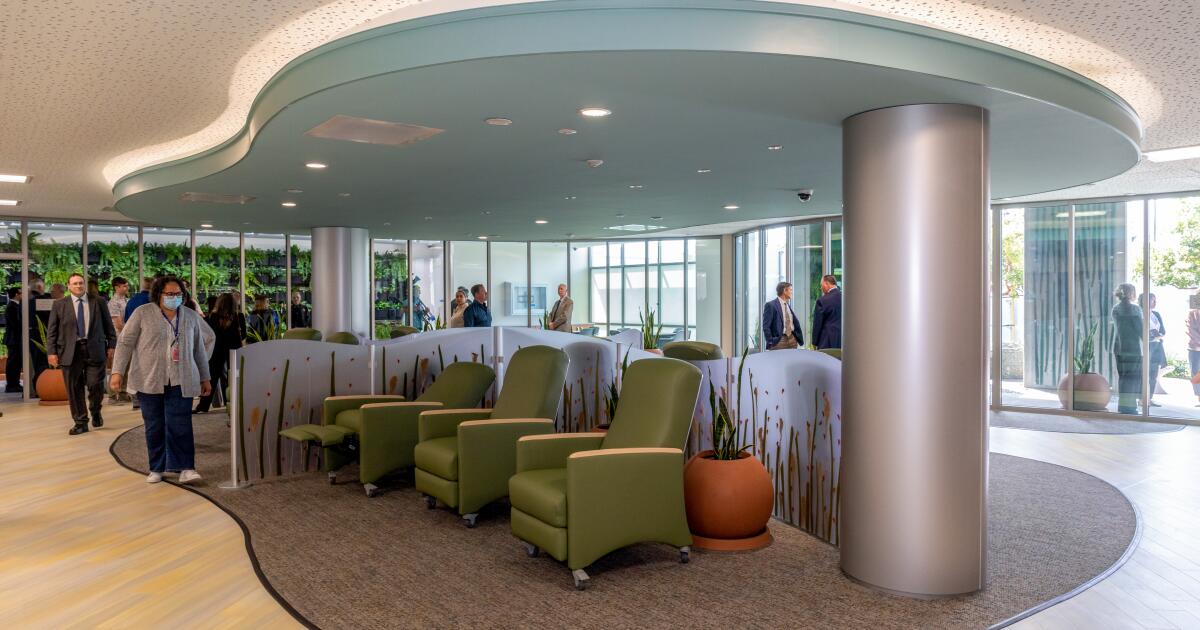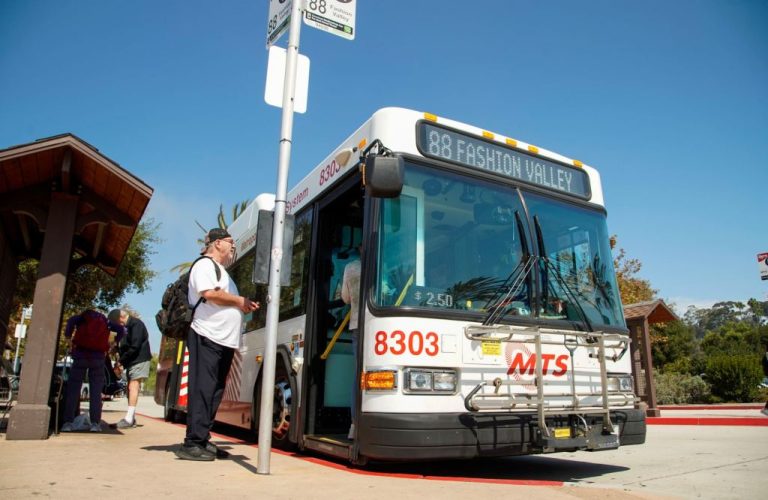
All leaders at all levels have agreed since Tri-City Medical Center closed its mental health care unit in 2018 that increasing local psychiatric treatment capacity is a top priority.
But, as 2024 approaches its midpoint, it is clear that moving quickly on big mental health projects has been an elusive goal.
Whether replacing Tri-City’s closed mental health unit, remodeling existing space at the former Alvarado Hospital in La Mesa or building large new facilities in Chula Vista and Escondido, projects that have looked promising in conversation have not materialized as quickly as everyone had hoped.
San Diego County is not alone, said Karen Larsen, chief executive officer of the Steinberg Institute, a Sacramento-based nonprofit focused on transforming mental health and substance use care.
Mental health infrastructure, she said, is very similar to homeless housing in its often-glacial pace of progress.
“I wish I could tell you that San Diego is just really screwed up, and if you just had better leadership, it would be fixed,” Larsen said. “But that’s not the reality. This is playing out statewide.”
The issue, she added, is not a lack of political will or funding. Billions and billions are in the pipeline to get projects done as quickly as possible. But when it comes time to move quickly, myriad factors coalesce.
“Just like with homelessness, it’s the same story over and over again: It’s either neighborhood opposition or struggles with permitting or just the sheer costs of labor and materials that have skyrocketed over the past several years,” Larsen said. “And those factors have only been exacerbated, obviously, by the COVID-19 pandemic.”
While some progress has been made in minimizing some forms of government red tape, such as the need to do extensive environmental studies for every project, bureaucracy remains for any project “where you’re braiding a variety of funding streams and have multiple state, county and city departments involved.”
“Everything just gets really complicated, really quick,” Larsen said.
Tri-City is a good example.
Though everyone agreed in mid-2018 that the hospital’s shuttered 18-bed behavioral health unit urgently needed to be replaced, it took about one year of government study and negotiation before a building agreement was approved in 2019.
Finally, progress will arrive in 2024 with a new 16-bed mental health facility built and paid for that the county is opening on Tri-City’s Oceanside campus. But that ribbon cutting, anticipated in the late summer or fall, comes a full six years after a mental health infrastructure crisis was declared in North County.
While there was some talk that an expedited project could be built in 12 to 18 months, the project did not even break ground until late 2022.
That was the same year that Palomar Health announced it would build a 120-bed mental health hospital on its main Escondido medical campus in partnership with Kindred Healthcare. Thus far, ground remains unbroken, though Palomar said last week that it intends to start construction in May while at the same time saying it intends to close its 12 remaining mental health beds in Poway “to allow the health system to focus resources” on the new building in Escondido.
Scripps Health has had no luck executing a similar plan for a 120-bed standalone mental health facility on a vacant lot in Chula Vista. Announced in 2019, the medical provider estimated the facility, built in partnership with a Tennessee-based developer, would open in 2023. But public opposition to the chosen location, and the developer’s track record in other states, led the local City Council to reject the project in 2022.
It has been a similarly frustrating schedule for what has been touted as the county health department’s linchpin of mental health infrastructure revitalization in San Diego’s urban core. Initial plans to build a multi-service “hub” on a choice piece of county-owned property on Third Avenue in Hillcrest saw a clever pivot in 2022 when leadership, finding that the plan would cost $100 million and take until at least 2026 to complete, instead proposed adding 62 mental health beds at what was then called Alvarado Hospital in La Mesa.
Because the tower is already built and licensed — one of its floors already houses a new 30-bed geriatric mental health care unit — the estimate was that this remodel project could be turned around in roughly 18 months, opening “at the end of 2023,” as one county official said in an email.
But, as of this week, the work remains on the drawing board, and Alvarado is no longer even operating under that name. In October, UC San Diego Health purchased the entire property, now calling the facility its “East Campus.”
Patricia Maysent, chief executive officer of UCSD Health, which has always been on tap to run the unit, even before she led the purchase of the whole hospital from Prime Healthcare late last year, said there is no doubt that additional mental health care resources will be added to that western tower.
Plans to replace UC San Diego Medical Center in Hillcrest require demolition of that hospital’s 30-bed mental health unit, and East Campus is the new location of the university health system’s hospital-based mental health work going forward.
“For us, we’re running out of time from the point of view that we’re going to need to knock down our inpatient behavioral health unit in Hillcrest,” Maysent said. “We actually need to get this done, so we can make that move happen.”
Maysent said that planning work performed over the past two years is in her team’s possession, and can still be put into practice. But final buy-in is needed from the county, which has been a driving force in the deal since 2022.
“I think we’re on a fast track to get this done if we can get to a term sheet that both sides are comfortable with, I think we’ll be able to move quickly,” Maysent said.
Exactly what has taken so long is a bit murky. Officials with Prime Health Care, Alvarado’s former owner, were not terribly forthcoming about holdups when the UCSD purchase was announced and finalized in late 2023, and Maysent declined to delve deeper into that relationship on the record last week.
When the Alvarado mental health hub idea surfaced in August of 2022, county officials said they were willing to allocate about $28 million to the project and planned to move the bulk of inpatient beds from the county’s mental health hospital on Rosecrans Street in the Midway District.
The idea was to free up space to increase the number of specialty skilled nursing beds available for patients with long-term and complex mental health care needs.
Maysent said UCSD is still on board with following the original vision but added that, with UCSD’s other hospitals bursting at the seams, there is also pressure to use the space in the west tower, beyond that needed to replace the university’s Hillcrest behavioral health unit, for other services.
“Speaking for UCSD Health, we have a lot of pressure to more forward, in one way or another, quickly,” Maysent said. “I need to really have a good sense of where we’re going by the end of the month, by the end of April.”
Luke Bergmann, director of the county’s behavioral health department, did not respond to questions about the county’s plans for Alvarado, though a presentation he gave to the county Board of Supervisors Tuesday on the region’s inventory of board and care beds did touch on the issue.
A board letter says that the county is “exploring a reconfiguration of services within the San Diego County Psychiatric Hospital that would, in near time, shift from providing only psychiatric acute inpatient care and crisis stabilization services to a model that includes a small inpatient unit and crisis stabilization unit, with the remaining capacity shifting to subacute services to align with the level of care needed by a majority of clients receiving services.”
Much of the county’s work in recent years, Bergmann reminded the county board last week, has been around prevention, helping to expand mental health care screening to local schools and to increase the number of board and care beds willing to accept those on public assistance with psychiatric diagnoses.
Opening crisis-stabilization units in North County since 2018 has, he said, started to lessen the pressure on emergency departments.
“Since January of 2020, monthly admissions through the psych hospital emergency psych unit triage have decreased by 38 percent while admissions to other county (crisis stabilization units) have increased by 429 percent,” Bergmann said.
As he has in previous presentations, Bergmann made the case that it is not additional beds in locked hospital wards that will break the region’s mental health care logjam. Average stays in skilled nursing facilities, the most common location for a patient with long-term needs to go after treatment in a locked hospital unit, currently range from 331 to 789 days, far longer than the 30 to 90 days estimated to be appropriate to address their medical needs.
Board and care beds, often offered by small operators in residential homes, are thought to be the solution to moving patients out of skilled nursing facilities more quickly, which would free up spots for mental health patients currently stuck in locked hospital units while they wait for a skilled nursing bed.
But a county investigation found that while the region has more than 30,000 board and care beds, only 255 accept mental health patients on Supplemental Security Income, a government program that provides extra income to disabled children and adults and those over age 65 of modest means.
County researchers calculate that an additional 380 board and care beds for this population are necessary to get the entire system flowing again.
Toward that goal, the county estimates that between 100 and 150 new board and care beds for people with behavioral health conditions will become available in the coming 2024-2025 fiscal year, funded by a $44.3 million state grant. Further down the road, the county plans to add another 150 such beds in a new facility built on its Third Avenue property and about the same number on an as-yet-unspecified county property in East County, which is also seeing a grant-funded addition of 12 inpatient beds at county-owned Edgemoor skilled nursing in Santee.
Noting that he is an engineer by training, Supervisor Jim Desmond expressed his desire to see more infrastructure built rather than discussed.
“You know, I like to build stuff,” Desmond said.
Bergmann said that he believed the state’s recent passage of a $6.4 billion infrastructure bond for mental health should help Desmond get his wish, especially in regards to new facilities on Third Avenue and in East County.
“We do see a lot of infrastructure opportunity with Prop. 1. That’s going to be huge, and we will be thinking about that in the context of the needs that we’ve described here,” Bergmann said.




